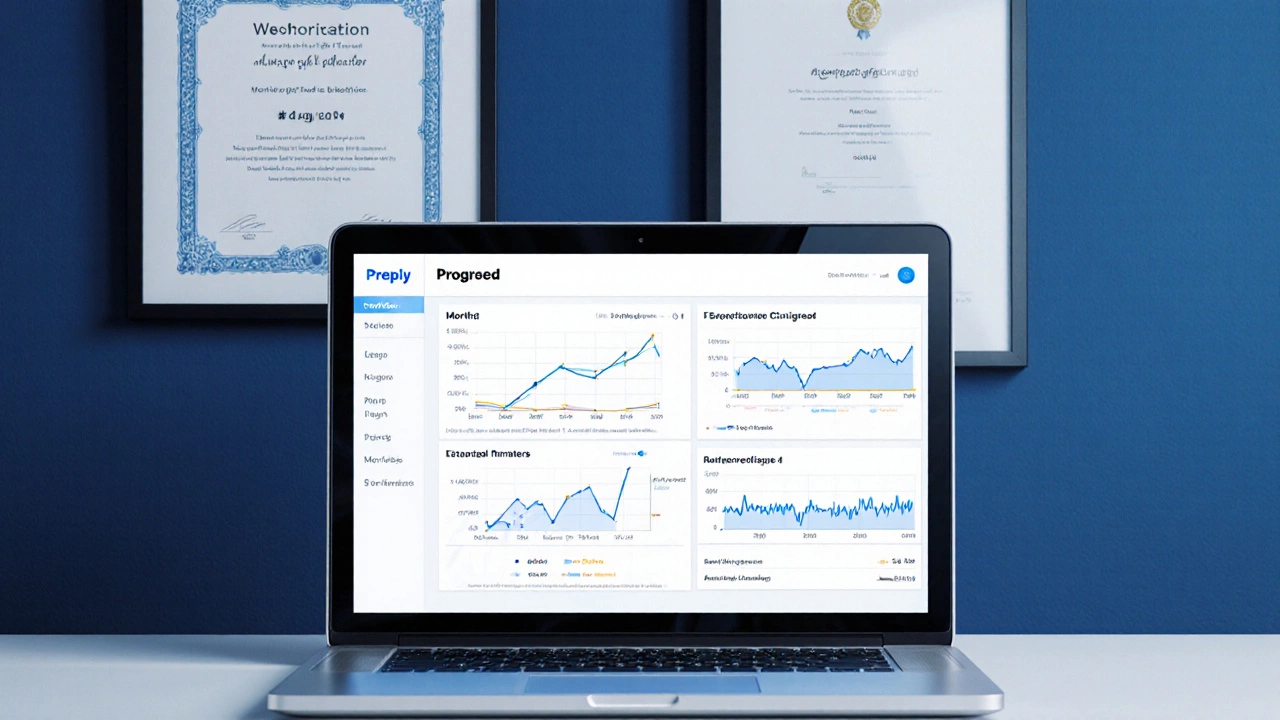
English Speaking Course Finder
Find your perfect English speaking course
Answer these quick questions to get personalized recommendations based on your situation.
Your recommended courses:
Want to speak English confidently but don’t know where to start? You’re not alone. Millions of people around the world are trying to move beyond textbook English and actually hold real conversations. The problem isn’t lack of motivation-it’s choosing the right platform. Not all English courses are made equal. Some teach grammar rules but never let you speak. Others throw you into deep water without support. The best sites for English speaking courses combine structure, real feedback, and daily practice that actually sticks.
What makes a good English speaking course?
A great speaking course doesn’t just give you vocabulary lists. It forces you to talk. It gives you corrections. It builds your confidence through repetition and real-life scenarios. Look for three things: live interaction with native speakers, personalized feedback, and a clear path from beginner to fluent.
Many apps let you record yourself and play it back. That’s not enough. You need someone to tell you why your pronunciation sounds off, or how your sentence structure confuses listeners. Fluency isn’t about knowing 5,000 words. It’s about using 500 words naturally, in real time, without freezing up.
Studies show that learners who get feedback within 24 hours improve 40% faster than those who don’t. That’s why platforms offering live coaching beat ones with only AI chatbots.
Italki: Best for personalized one-on-one coaching
Italki connects you directly with professional teachers and community tutors from over 150 countries. You pick your teacher based on their style, price, and availability. Some are certified ESL instructors. Others are native speakers who work in business, nursing, or engineering-people who use English every day.
Lessons are 25 to 60 minutes. You can focus on job interviews, casual chats, or even accent reduction. Most teachers give you homework after each session-like recording a 2-minute story or practicing a specific phrase. You get a written summary and corrections after every lesson.
Prices range from $5 to $30 per hour. Community tutors (non-certified but fluent speakers) are cheaper and great for casual practice. Professional teachers cost more but offer structured lesson plans and official progress tracking.
Over 12 million users have improved their speaking skills on Italki. One user from Brazil went from barely understanding Netflix to giving a presentation at her company in six months.
Preply: Best for structured learning with certified teachers
Preply is similar to Italki but leans more toward formal education. All teachers are vetted, and most have teaching certifications like TEFL or TESOL. The platform offers pre-built lesson plans for different goals: business English, IELTS speaking, or everyday conversation.
What sets Preply apart is its learning dashboard. You track your progress week by week. It shows how many minutes you’ve spoken, how often you’ve missed class, and your improvement in pronunciation scores. Teachers can upload audio clips of your speech for comparison over time.
Many users on Preply are preparing for job interviews or university admissions. The platform has a special track for professionals needing to sound natural in meetings. One engineer from India improved his clarity so much that he was promoted to lead a global team after just four months.

Cambly: Best for spontaneous, no-pressure practice
If you’re nervous about speaking or hate structured lessons, Cambly is your best bet. There are no schedules. No homework. No tests. You log in, pick a tutor from a list, and start talking. Tutors are mostly native speakers from the U.S., Canada, Australia, and the UK.
It’s like having a coffee chat with someone who’s trained to help you speak better. They’ll gently correct you if you say something awkward. They’ll ask follow-up questions to keep the conversation going. You can talk about your day, your favorite movie, or your travel plans.
At $7 per hour, Cambly is one of the cheapest options for daily practice. Many users do 15-20 minutes every morning before work. The key? Consistency. People who use Cambly 4-5 times a week see noticeable improvement in 6-8 weeks.
EF English Live: Best for a full curriculum with group classes
EF English Live is the only platform here that feels like a real online school. It offers structured courses from A1 to C2, with video lessons, interactive exercises, and live group classes of 4-6 students.
The group format is great if you learn better with peers. You’ll role-play job interviews, debate topics like climate change, or discuss news articles. The teacher moderates and corrects everyone in real time. It’s less one-on-one than Italki, but you get exposure to different accents and styles of speaking.
EF also has AI-powered speech recognition that analyzes your pronunciation and gives instant feedback. You can practice alone anytime-reciting dialogues, repeating phrases, or answering questions. The platform tracks your progress and suggests which areas to focus on next.
Used by over 2 million learners, EF is ideal if you want a complete English learning system-not just speaking, but listening, reading, and writing too.
Speaky: Best for free peer-to-peer language exchange
Speaky is a free app that matches you with native English speakers who want to learn your language. You chat via text, voice, or video. You spend 30 minutes speaking English, then 30 minutes speaking your native language.
It’s not a formal course. There are no teachers. No structured lessons. But it’s the best free option if you want to practice real conversation with real people. Many users find long-term language partners this way.
One user from Indonesia met a student in Canada through Speaky. They’ve been chatting for two years. She now works remotely for a U.S.-based company. He’s learning Indonesian to move there.
Just be careful: not everyone is serious. Some people join just to make friends. But if you’re clear about your goal-"I want to improve my speaking, can you correct me?"-you’ll find the right matches.

How to choose the right one for you
Ask yourself three questions:
- How much time can you commit? If you have 15 minutes a day, Cambly or Speaky work best. If you can do 3-4 hours a week, Italki or Preply give faster results.
- What’s your goal? Job interview? Go for Preply. Casual conversation? Try Cambly. Academic English? EF English Live.
- Do you need feedback? If yes, avoid apps that only use AI. Go for live teachers. If you’re okay with making mistakes and learning by trial and error, Speaky is fine.
Most people start with Cambly or Speaky to build confidence. Then they move to Italki or Preply for deeper improvement. EF English Live is great if you want everything in one place.
What not to do
Don’t waste money on platforms that promise fluency in 30 days. That’s marketing, not learning. Don’t rely on YouTube videos alone. Watching someone speak isn’t the same as speaking yourself.
Don’t wait until you "feel ready." You’ll never feel ready. You get better by doing it badly at first. Say something wrong. Get corrected. Say it again. That’s how fluency happens.
Real results, real people
A teacher from Mexico used Italki three times a week for six months. She went from hiding in Zoom meetings to leading training sessions for her company. Her boss didn’t even notice the accent anymore.
A student from Vietnam practiced on Cambly every morning before his 8 a.m. shift. After three months, he got a promotion because he could communicate with international clients.
Fluency isn’t about perfection. It’s about being understood. And the best sites for English speaking courses help you get there-step by step, word by word, conversation by conversation.
What is the cheapest way to learn English speaking?
The cheapest way is using Speaky for free language exchange. You can also try Cambly’s free trial or look for community tutors on Italki who charge as little as $5 per hour. Consistency matters more than cost-15 minutes daily beats one long session a week.
Can I learn to speak English without a teacher?
You can improve, but you won’t reach fluency without feedback. AI tools can’t catch subtle errors in word choice, tone, or natural phrasing. A real person will tell you why "I am very happy" sounds odd when you mean "I’m thrilled." Feedback turns practice into progress.
How long does it take to speak English fluently?
It depends on your starting point and how often you practice. Most people see clear improvement in 3-6 months with 3-5 sessions per week. Fluency-being comfortable in most conversations-usually takes 8-12 months of consistent daily practice. There’s no shortcut, but the right platform makes it faster.
Are online English courses better than in-person classes?
Online courses are often better for speaking practice. In-person classes can be expensive, inflexible, and have large groups. Online platforms give you access to native speakers worldwide, flexible scheduling, and personalized feedback. You can practice in your pajamas at 7 a.m. before work-that’s hard to beat.
Which site is best for business English speaking?
Preply is the best for business English. Many teachers specialize in corporate communication, presentations, and meetings. You can request lessons focused on writing emails, negotiating, or leading virtual calls. EF English Live also has strong business modules with real workplace scenarios.
